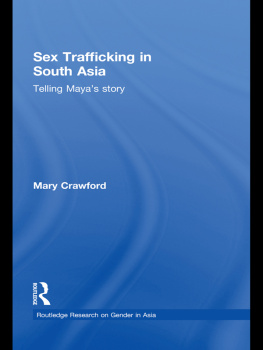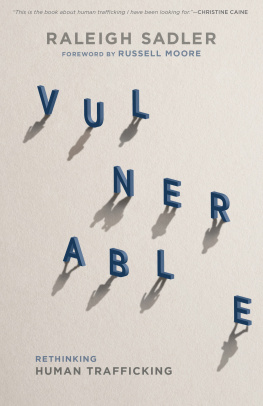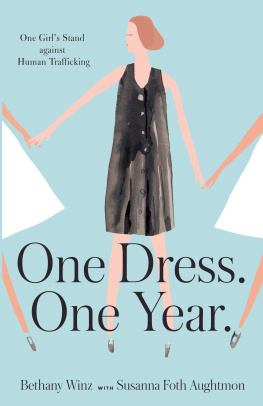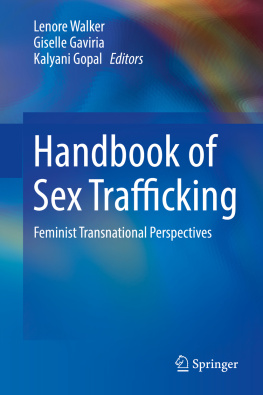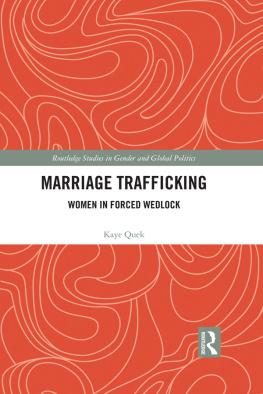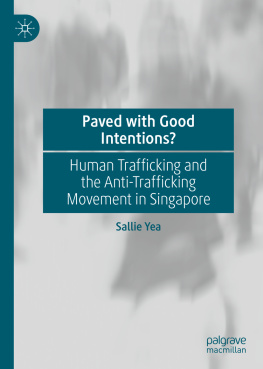Sex Trafficking in South Asia
This book is a critical feminist analysis of sex trafficking. Arguing that trafficking in girls and women is a product of the social construction of gender and other dimensions of power and status within a particular culture and at a particular historical moment, this book offers the necessary locally grounded analysis.
Focusing on the case of Nepal, from where thousands of Nepali girls and women are trafficked each year primarily to India, Mary Crawford assesses how the social construction of traffickingthe concept and its representation in discourseare influenced by the dynamics of gender, caste, and the development establishment. The defining figure is an innocent, nave young girl being lured or duped into leaving the safety of her village. The trafficking victim is portrayed as backward; however, she is backward in specific ways that resonate with Nepals struggle to resist and yet encompass Western influence. This view may lead to paradoxical effects in which efforts to protect girls and women instead restrict their human rights. Rather than seeing women as universalized victims, Crawford assesses how the social construction of trafficking in a particular society affects girls and women who live in that society.
In this book, the authors voice as a woman, a feminist, and a social scientist immersed in a foreign way of life illuminates aspects of this process. It makes the connection between Nepali subjectivities and a problem of international significance, the trafficking of girls and women. The book provides a model for other locally grounded accounts of sex trafficking to counter the universalizing rhetoric of the mass media and some anti-trafficking activists, filling a niche in South Asian Studies and Womens Studies.
Mary Crawford is Professor of Psychology and Womens Studies at the University of Connecticut. She is the author of more than 50 research articles and ten books including Talking Difference, Innovative Methods for Feminist Psychological Research, and Transformations: Women, Gender, and Psychology.
Routledge Research on Gender in Asia Series
1. Women, Identity and Indias Call Centre Industry
JK Tina Basi
2. Feminist Research Methodology
Making meanings of meaning-making
Maithree Wickramasinghe
3. Sex Trafficking in South Asia
Telling Mayas story
Mary Crawford
Sex Trafficking in South Asia
Telling Mayas story
Mary Crawford

LONDON AND NEW YORK
First published 2010
by Routledge
2 Park Square, Milton Park, Abingdon, Oxon, OX14 4RN
Simultaneously published in the USA and Canada
by Routledge
270 Madison Avenue, New York, NY 10016
Routledge is an imprint of the Taylor & Francis Group, an informa business
This edition published in the Taylor & Francis e-Library, 2009.
To purchase your own copy of this or any of Taylor & Francis or Routledges collection of thousands of eBooks please go to www.eBookstore.tandf.co.uk.
2010 Mary Crawford
All rights reserved. No part of this book may be reprinted or
reproduced or utilised in any form or by any electronic,
mechanical, or other means, now known or hereafter
invented, including photocopying and recording, or in any
information storage or retrieval system, without permission in
writing from the publishers.
British Library Cataloguing in Publication Data
A catalogue record for this book is available from the British Library
Library of Congress Cataloging-in-Publication Data
Crawford, Mary (Mary E.)
Sex trafficking in South Asia : telling Mayas story /
Mary Crawford1st ed.
p. cm.(Routledge research on gender in Asia series)
Includes bibliographical references and index.
1. Human traffickingSouth Asia. 2. ProstitutionSouth Asia.
3. WomenSocial conditionsSouth Asia. I. Title.
HQ281.C73 2010
363.4'40954dc22 2009025679
ISBN 0-203-86281-3 Master e-book ISBN
ISBN10: 0-415-77843-3 (hbk)
ISBN10: 0-203-86281-3 (ebk)
ISBN13: 978-0-415-77843-5 (hbk)
ISBN13: 978-0-203-86281-0 (ebk)
For Ranju
Contents
Preface
Years ago, I came across an obscure volume by a former Peace Corps worker in Nepal, who wrote of the difficulties of his work there and of his (never realized) ambition to climb a modest peak in the Solu Khumbu. If I remember correctly, the book was titled The Two-Year Mountain. That title came to my mind again as I worked on this book, which sometimes felt like a two-year mountain of its own. It has been a daunting task to make sense of what I experienced doing fieldwork on sex trafficking in Nepal, and to represent it in all its complexity. In writing this book, my first goal was to document the realities of sex trafficking in this part of South Asia. But I wanted to do more than just report the facts about sex trafficking. The subtitle I chose for this volume, Telling Mayas story, is intended to indicate that I also focus on the discourse of sex trafficking, addressing questions such as: How are victims of sex trafficking represented? Who is authorized to tell their stories? Whose interests do such representations serve? Thus, this book is a critical analysis of a disturbing form of sexual exploitation.
At the outset of this project, when I was not always able to articulate its shape even to myself, I was fortunate to receive considerable institutional support. The Council for the International Exchange of Scholars awarded me a Fulbright Senior Scholar Grant (20045) that made possible the fieldwork in Nepal. This was supplemented by a grant from the University of Connecticut Human Rights Institute. The University of Connecticut also provided a sabbatical leave for the academic year 20045. I am grateful for such tangible support during the crucial early stages of this project. In its later stages, a University of Connecticut Humanities Institute Fellowship (20078) provided me with precious time to begin the writing of this book.
Many individuals contributed to this book. First and foremost I would like to express my thanks to those who helped me while I lived and worked in Nepal during 2004 and 2005. Mrs Durga Ghimire and the women and men of ABC/Nepal welcomed me with affection, included me in the work of ABC/Nepal, and patiently answered all my questions. It has been an honor to work alongside these remarkable feminist activists. I also want to express my gratitude to Ms. Deepti Khati, who participated in the Nepal fieldwork as a full-time research assistant. Deepti was not only a competent and dedicated research assistant; she also taught me much about the changing lives of Nepali women in an era of rapid modernization. Other research assistants contributed their skills to various parts of the project; my thanks to Alka Gurung, M.A., Anjana Chalise Regmi, M.A., and Pinky Jha, M.D. Former UConn graduate student Michelle Kaufman joined me for part of the fieldwork, contributing greatly to the ABC/Nepal interviews and other aspects of the research. Michelle has gone on to develop independent research projects in womens health in Nepal, and we continue to collaborate on trafficking-related research. I thank Dinesh and Renuka Thapa for sharing their home with me, my old friend Kiran Magar for his companionship, Mike Gill for his stewardship of the Fulbright program in Nepal, and all the program staff for their dedication and professional services. Thanks too to Mike Gill, Kathryn March, and Bidya Ranjeet for helping to verify my Nepali-to-English translations.

